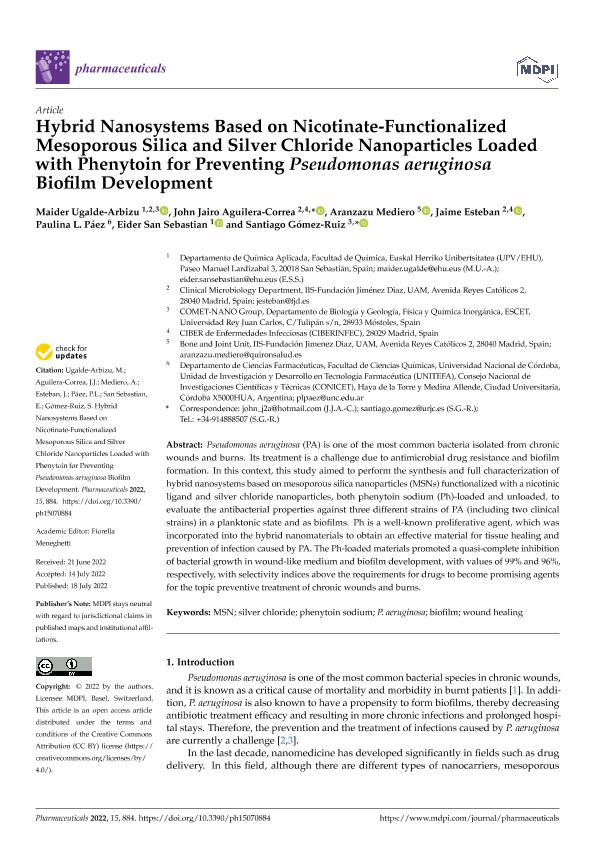Artículo
Hybrid nanosystems based on nicotinate-functionalized mesoporous silica and silver chloride nanoparticles loaded with phenytoin for preventing pseudomonas aeruginosa biofilm development
Ugalde Arbizu, Maider; Aguilera Correa, John Jairo; Mediero, Aranzazu; Esteban, Jaime; Páez, Paulina Laura ; San Sebastian, Eider; Gómez Ruiz, Santiago
; San Sebastian, Eider; Gómez Ruiz, Santiago
 ; San Sebastian, Eider; Gómez Ruiz, Santiago
; San Sebastian, Eider; Gómez Ruiz, Santiago
Fecha de publicación:
07/2022
Editorial:
MDPI
Revista:
Pharmaceuticals
e-ISSN:
1424-8247
Idioma:
Inglés
Tipo de recurso:
Artículo publicado
Clasificación temática:
Resumen
Pseudomonas aeruginosa (PA) is one of the most common bacteria isolated from chronic wounds and burns. Its treatment is a challenge due to antimicrobial drug resistance and biofilm formation. In this context, this study aimed to perform the synthesis and full characterization of hybrid nanosystems based on mesoporous silica nanoparticles (MSNs) functionalized with a nicotinic ligand and silver chloride nanoparticles, both phenytoin sodium (Ph)-loaded and unloaded, to evaluate the antibacterial properties against three different strains of PA (including two clinical strains) in a planktonic state and as biofilms. Ph is a well-known proliferative agent, which was incorporated into the hybrid nanomaterials to obtain an effective material for tissue healing and prevention of infection caused by PA. The Ph-loaded materials promoted a quasi-complete inhibition of bacterial growth in wound-like medium and biofilm development, with values of 99% and 96%, respectively, with selectivity indices above the requirements for drugs to become promising agents for the topic preventive treatment of chronic wounds and burns.
Palabras clave:
BIOFILM
,
MSN
,
P. AERUGINOSA
,
PHENYTOIN SODIUM
,
SILVER CHLORIDE
,
WOUND HEALING
Archivos asociados
Licencia
Identificadores
Colecciones
Articulos(UNITEFA)
Articulos de UNIDAD DE INVESTIGACION Y DESARROLLO EN TECNOLOGIA FARMACEUTICA
Articulos de UNIDAD DE INVESTIGACION Y DESARROLLO EN TECNOLOGIA FARMACEUTICA
Citación
Ugalde Arbizu, Maider; Aguilera Correa, John Jairo; Mediero, Aranzazu; Esteban, Jaime; Páez, Paulina Laura; et al.; Hybrid nanosystems based on nicotinate-functionalized mesoporous silica and silver chloride nanoparticles loaded with phenytoin for preventing pseudomonas aeruginosa biofilm development; MDPI; Pharmaceuticals; 15; 7; 7-2022; 1-19
Compartir
Altmétricas



